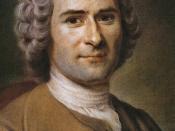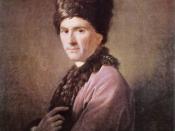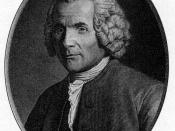One of the most important writers of the Enlightenment was the philosopher and novelist Jean-Jacques Rousseau (1712-1778). The work of Rousseau has influenced a generation and beyond and it is argued that the main ideals of the French and American revolutions arose from his works, for example The Discourse on Equality. The main concept of Rousseau's thought is that of 'liberty', and his belief that modern society forced humans to give up their independence, making everyday life corrupt and unfree. One of the central problems Rousseau confronted is best summed up in the first line of arguably his most important work, The Social Contract.
'Man is born free but everywhere in chains'1
This quote is an expression of Rousseau's belief that humans are corrupted by modern day society. Rousseau says that the state is unjust and corrupt and is dominated by the rich and the powerful. While the poor only know oppression and unhappiness, these aristocrats use it selfishly to further their own interests.
The modern state deprives human beings of their natural freedom and promotes self-centred individualism that undermines equality and concern for the common good.22
According to Rousseau the modern state and the accumulation of human knowledge, improved human understanding but corrupted the human species morally. In his works A Discourse on the Origin of Inequality (1755) and A Discourse on the Arts and Sciences (1751), Rousseau questioned advances in knowledge and rejected the glorification of reason that was central to the outlook of the philosophers. The philosophers, he believed, had given people better reasoning but had destroyed them morally. The price paid for cultural and intellectual progress was the moral decline of the individual, a condition that could no longer be endured.3
Rousseau drew up sharp, contrasting characteristics between the 'civilized and societal man' and the 'natural...


